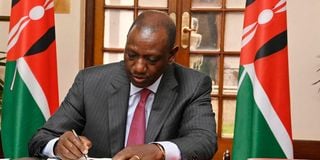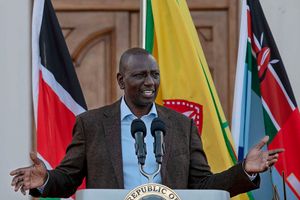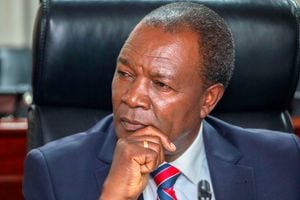
President William Ruto assents to the Supplementary Appropriation (No.3) at State House, Nairobi in November 2023.
Plans by President William Ruto’s administration to introduce additional taxes to raise more revenue has kicked up a storm.
The 2024 Budget Policy Statement (BPS), which is currently before Parliament, contains proposals that seek to boost revenue collection by expanding the tax base in a move that could see Kenya Revenue Authority (KRA) raid Kenyans’ pockets even more.
The move risks making the already high cost of living to increase further. The Azimio la Umoja One Kenya Coalition Party yesterday warned that the tax burden is set to increase drastically with the implementation of the proposals that are contained in the BPS document.
‘Punitive taxes’
Speaking while addressing a press briefing yesterday, Wiper leader Kalonzo Musyoka described the proposals as a “second wave of punitive taxes”. The new tax proposals add to the new levies that took effect in the first budget of the Kenya Kwanza administration.
“After going through the Kenya Kwanza’s Budget Policy Statement, our position is that the economic proposals, policies and strategies remain flawed and unachievable. As we have always said, this regime is completely irredeemable,” said Mr Musyoka.
Agricultural produce
He cited introduction of the Value Added Tax (VAT) on educational services and taxes on agricultural produce as some of the proposals that are set to make life more expensive.
The coalition said the proposals are likely to lead to double taxation, claiming that Kenyans could end up paying at least Sh27,000 each in additional taxes should the proposals be implemented.
“To the ordinary Kenyans, the mama mboga, boda boda operators and the people of mjengo [construction workers], the regime is coming again with a double taxation plan with increased taxes of approximately Sh27,000 per adult Kenyan,” he said during the briefing in Nairobi.
He said the proposed advance tax on goods and services supplied to the government and VAT on educational services would mean an increase in school fees and taxation of agricultural produce.
The opposition coalition called on the government to reduce its expenditure and focus on cutting down taxes as a way of making life affordable for ordinary citizens.
The Ruto administration also plans to introduce a withholding tax on payment on goods supplied to ministries, departments and agencies.
The proposal is part of the government’s plan to expand the tax base and help it raise close to Sh2.95 trillion in taxes in the 2024-2025 financial year.

A trader counts the day’s sales at Gikomba Market in Nairobi in October last year. A new proposal by the government to widen the tax base will hit pockets hard.
Government services
“The government is a major consumer of goods and services. Currently, withholding tax is applied on services provided to public entities. To expand the tax base, the government is introducing withholding tax on payment on goods supplied to Ministries, Departments and Agencies (MDAs),” said the National Treasury in the budget paper.
The proposal, if implemented, is likely to be opposed by suppliers of government services, who already pay 16 percent VAT on their goods.
It is also not clear whether the withholding tax will be a final tax or a credit which a taxpayer can claim when they file for their income tax at the end of the year.
A final withholding tax of five percent will also be introduced on farm produce supplied to co-operative societies and factories, a move that is likely to push farmers into informal channels as the cost goes up.
The Ruto administration, through the 2023 Medium Term Revenue Strategy, plans to deal with the hard-to-tax areas such as the agricultural sector, which is the largest contributor to the gross domestic product (GDP) and employs millions of Kenyans in rural areas.
The Medium Term Revenue Strategy will also introduced 16 percent on extra-curricular activities charged by schools such as swimming, which the Azimio coalition says will raise fees charged by schools.
Most of these proposals are likely to come into effect beginning July tis year when the Kenya Kwanza administration begins to implement its second budget.
Treasury Cabinet Secretary Njuguna Ndung’u notes in the BPS that the overall objective is “to guide the development of a progressive tax system that enhances revenue mobilisation by the tax administration, promotes investment and fosters a flexible fiscal space”.
He further explains that the aim is to ensure that tax rates do not affect the demand of the product and the tax structure does not distort markets. It is also to ensure that taxes do not affect investment, the CS says.
But Azimio has said the country will only thrive if the government cuts taxes, instead of increasing them.
“The BPS reveals lofty figures in terms of revenue with huge deficits. We believe that the country will thrive when the regime moderates its expenditure, reduces wastages and adopts a right, and zero-based budgeting approach.”
Eradicate the middle-class
“The Budget Policy Statement, 2024 is high sounding, vague with promising titles but only intends to raise expenditures and to spend what we don’t have,” said Mr Kalonzo.
While arguing that some of the tax policies adopted by President Ruto’s administration will eradicate the middle-class as a result of depreciating earnings, Mr Musyoka also insisted that the Kenya Kwanza regime’s tax policies had driven a number of investors out of the country.
“We believe in creating an enabling environment for manufacturing so that more investors can set up in our country and provide jobs for our people. The Budget Policy Statement, 2024 offers little, if at all, in terms of encouraging manufacturing. Potential foreign investors are already fleeing Kenya because of the punitive taxes by the Kenya Kwanza regime,” the former Vice-President added.
Tripled the tax
The opposition coalition issued the warning following a meeting its lumiaries held at the Jaramogi Oginga Odinga Foundation, which was chaired by Mr Musyoka and attended by National Assembly Minority Leader Opiyo Wandayi, former Laikipia governor Ndiritu Muriithi, Roots Party leader George Wajackoyah and former Murang’a governor Mwangi wa Iria.
The warning by the coalition comes barely days after the government tripled the tax payable to the Energy and Petroleum Regulatory Authority (Epra) for every litre of the commodity purchased.
The Ministry of Energy last week increased the Petroleum Regulatory Levy to Sh0.75 per litre up from Sh0.25. The levy is one of nine taxes and levies that are charged on fuel, and has been increased to fund the operations of the energy regulator.
Energy Cabinet Secretary Davis Chirchir last week published the Energy (Energy and Petroleum Regulatory Authority Petroleum Levy) Regulations, 2024 giving effect to the new charge.
In the BPS, the Treasury proposes capping Kenya's budget at Sh4.2 trillion with a budget deficit of Sh703 billion. The government has also proposed the expansion of its tax base and streamlining of revenue collection measures in order to meet its revenue targets.
Revenue as a percentage of GDP has been declining over the years from 18.1 percent in 2013-2014 to 14.3 percent in 2022-2023 while expenditure pressure has been rising. This scenario has resulted in increased borrowing to bridge the revenue gap.
Sustainable development
In its medium term revenue strategy (MTRS), the Treasury targets domestic resource mobilisation as a major source of long-term financing for sustainable development.
“The MTRS is aligned to the National Tax Policy and will guide tax administration to improve efficiency in the administration of tax laws, close loopholes for tax evasion, and enhance voluntary tax compliance. The MTRS is expected to hasten the fiscal consolidation process, thus reducing the fiscal deficit to facilitate the achievement of the EAC [East African Community] target of 3.0 percent of GDP,” states the document.
It adds:“The additional resources raised from the MTRS will facilitate the implementation of the Government’s Bottom-up Economic Transformation Agenda geared towards economic turn-around and inclusive growth through the Fourth Medium Term Plan (MTP IV) of the Vision 2030, as well as the Medium Term Expenditure Framework (MTEF).”
According to the document, implementation of MTRS is expected to raise revenue to GDP ratio from 14.3 percent in 2022-2023 to 20.0 percent by end of the financial year 2026/27.
It also seeks to increase tax compliance rate from 70 percent in 2022-2023 financial year to 90 percent by 2026-2027 financial year as well as to increase investment.
“The MTRS will be implemented within a three-year period beginning from FY 2024-2025 to FY 2026-2027. Tax policy reforms will be implemented through the Finance Acts and Regulations, beginning with the Finance Act, 2024 while revenue administration reforms will begin from January 2024 as per the implementation matrix annexed to the MTRS,” Treasury says in the document.










